Hello to all my Home Organizer friends!
Some people are intimidated about writing FaceBook posts and newsletters. I am not one of them. I find inspiration for FB posts and newsletters everywhere. For example, whenever one of my network friends posts something on FB or has an article in their newsletter that is relevant to my target market, I forward it to my Virtual Assistant and she posts it with a link their website. This helps build a rapport with my referral partners and gives me a wide variety of topics of interest to my current and prospective clients.
Home Organizers are all inspired by each other. Annette Reyman’s tag line “We get you moved in so you can move on . . . with life!” inspired my tagline “Let me help you catch up so you can keep up.”
I have attached a few photos that I plan to use as part of a future newsletter that will be tied in with my tag line. It will also be used as a FB post and a blog on my website.
The captions will read:
Problem: Samantha is a busy single mom who had never been able to carve out time to get her son’s playroom under control.
Solution: We purged the room of toys and books he had outgrown for four hours. Organizing was a breeze; it only took two hours.
Result: Cameron was thrilled to be able to play with his remote-control toys now that the controls are easy to find. He has taken ownership of his playroom and makes sure his friends and cousins help keep it tidy.
Testimonial: “I learned a different way of thinking. It’s OK to get rid of stuff and not be sad about it. Bobbie educated me with some valuable tips. For example, instead of putting all of my son’s small action figures in one big bucket, she suggested I buy an organizing unit where he can see all the figures and find the ones he wants. He has even categorized them himself!”
– Samantha, Langhorne PA
I also have fun with my FB posts and would like to share a draft for a future post. Perhaps it will inspire you to write something fun of your own.
How Loud is Your Clutter?
Does your clutter whisper, “Psst, I’m over here? I’m getting out of control.” Or does your clutter clear her throat and say “Ahem, over here bud. Pay me some attention.”
Ignore your clutter too long and it will scream out you, “Yo! You can’t ignore me any longer! I’m here, I’m out of control and you need to deal with me NOW!”
If your clutter is verbally abusing you, you need to call me! Let’s schedule a consult and quiet your clutter.
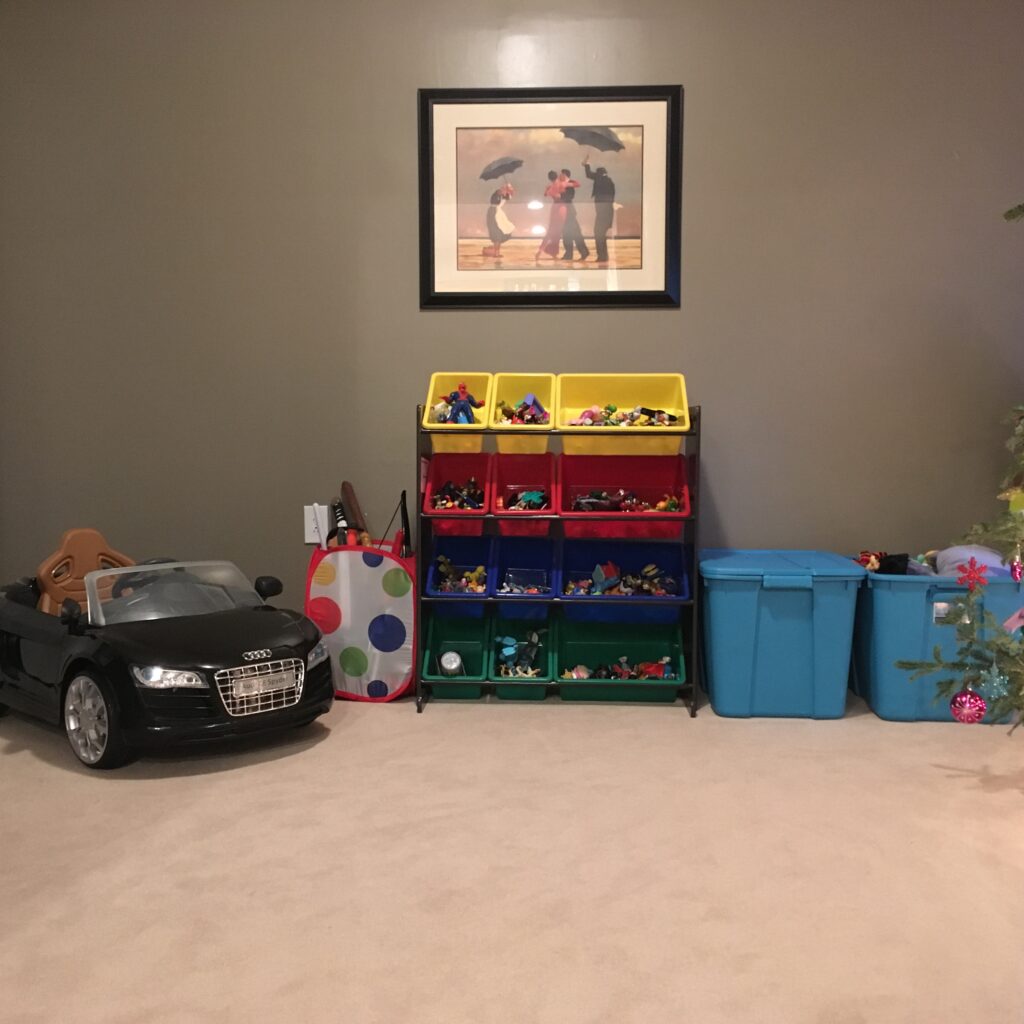
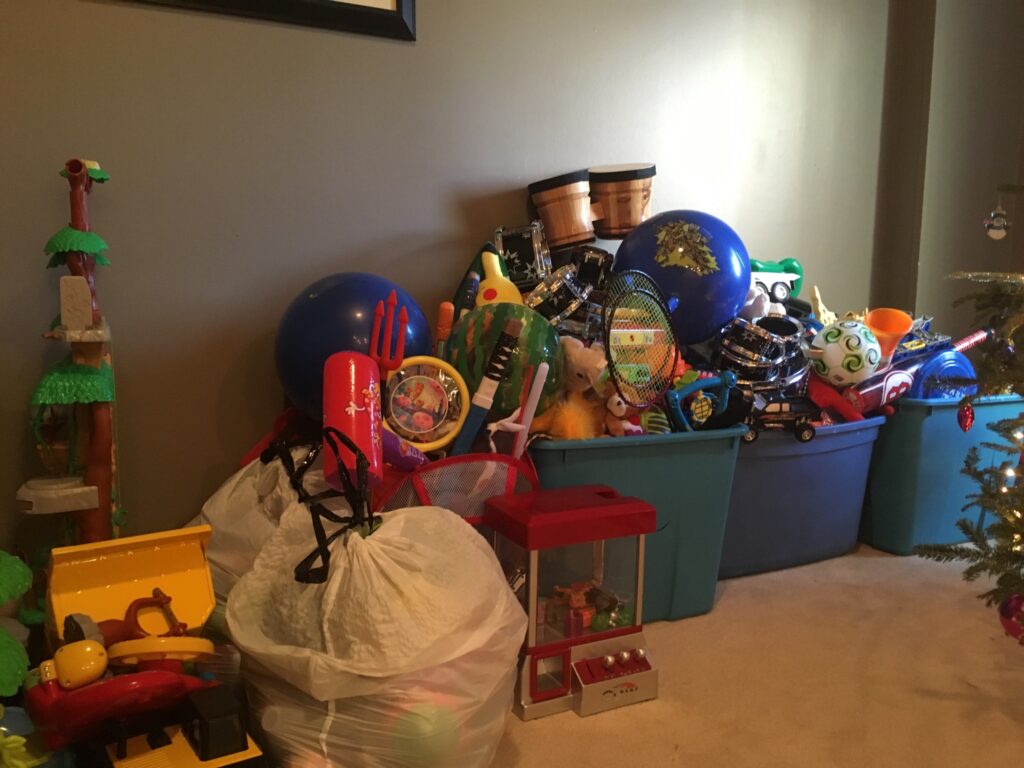
Remember that old saying “it’s just like riding a bike”? I have no idea who coined it, but it was meant to draw a comparison to activities that are deeply rooted in the muscle memory gained from lots of practice. The idea is, if you practiced enough, riding your bike becomes like second nature. If you practice enough, you can train your body to ride with a lot less thought or effort. And if that bike sat rusty in the garage for 10 years, because you had put forth the effort to practice years before, you can jump back on and ride away into the sunset as if only mere seconds had passed since your last pedal session.
People ask me a lot about the best ways to stay organized. Cleaning up and out seems to be the easy part, but now that the house is beautiful, and everything is put away in its place, how do we keep it this way? Depending on how far removed your new organizing behavior is from your old habits, staying organized is going to take the same vigor and endurance as it took to learn to ride that bike years ago.
For example, if you always lose your keys around the house, and we implement a new process to hang them on a hook by the door when you enter, you will need to make the conscious effort to actually do it…every time. It takes practice, and more practice, until eventually hanging the keys on the hook becomes second nature and engrained in your muscle memory. Suddenly hanging the keys on the hook will feel like an easy routine, and the process will no longer be a strain on your brain power and intention as you arrive home tired from work each night. The thing to remember is that there will be work involved. I unfortunately can’t wave a magic wand to “cure” us of our poor organizing habits and replace them with ones that work better for our lives. If I could, I would be the first to wave it over my own house!
There are a lot of schools of thought out there around best practices for forming habits and the importance of considering things like learning styles, motivators and goals. Developing new habits to stay organized will take time, support and accountability from family and friends, as well as a focused desire from whoever is embarking on this mission. I have lots of tricks up my sleeve to help move this process along for each client, but the overarching theme to remember is that practice makes perfect. You are going to have to conjure up the focus, intention and willpower to practice, but once mastered, your new habits really will be just like riding a bike!


I’ve been reading articles about the promise of a paperless office my entire life, and for the most part, those articles have just created more paper.
For the first time in modern history, we now have the tools to go completely paperless. But before you go invest in a new gadget and hunker down to scan all of your paper, you can probably do a lot to reduce the amount of paper in your life.
If you really want to go paperless, start with these steps to have less paper in your life. You’ll find more space in your home.
There are times, I am sure, when you have an extra 15 minutes where you just want to sit, relax, and take a few deep breaths. There is certainly nothing wrong with self-care. However, self-care can also take on another form where you want to use those extra 15 minutes to get something done in your home or office.
In my world, of course, it has to do with de-cluttering and organizing. There have been a couple of times recently where I took that 15 minutes with a client and myself to do just that.
A client of mine moved into assisted living several months ago. During one of our sessions, as I was helping her unpack and organize, I had some extra time. I went through one of her end table drawers in the living room and was able to recycle and trash 95% of what was in the drawer – old catalogs, old address labels, etc. Now, I could make room for other items that were important for her to have nearby in her new life.
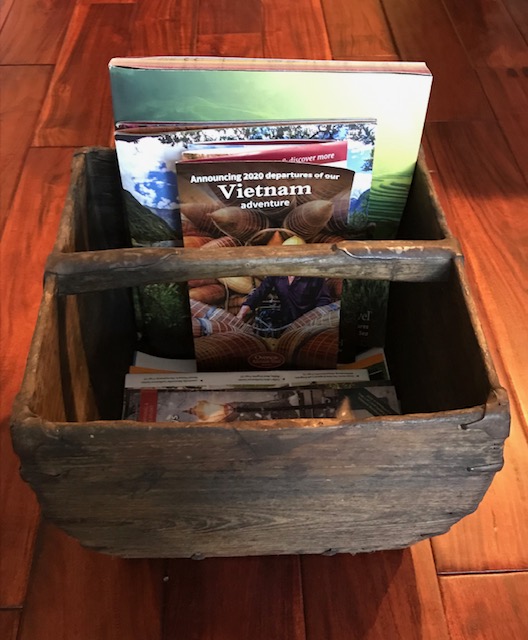
In my own life, I love to travel. I always have travel articles and catalogues that I keep in an antique rice holder box (pictured above). When I started going through my collection, I was amazed at what I could recycle – articles and catalogs that went back to 2016. Since the box never looked like it was totally overflowing, I just kept putting more articles and catalogs in it. As with my client, I was able to recycle 95% of what I had stored.
This led me to think what we can all do in 15 minutes to maintain our organizational systems. Maintenance and persistence always seem to be a huge challenge in the organizing world. Developing a system or process is 1 part of the project. Another part is maintaining or tweaking what you’ve already developed.
Consider what you can do in 15 minutes. You never know what you’ll find unless you go through these areas:
On any given day, we all make choices in our lives as to what to do with our time. With those extra 15 minutes that you have, you could sit back and relax or go through an area of your home or office to see what you no longer need. What is your choice today?
People hire organizers because they feel their lives are out of control and they are unable to get organized on their own. Frequently the problem is simply having too much stuff to organize. Often the weight of too many possessions can wear us down. When our space is cluttered and dis-organized it can impact every facet of our lives.
When the burden of too much clutter is lifted from our shoulders, we can feel physically lighter, more energetic and less stressed. This relief can lead to increased work productivity, greater enthusiasm and better relationships.
The question we need to ponder is why do we purchase so much in the first place? There are a number of explanations for this compulsion. Often, we simply want to possess the latest and greatest stuff because we think it’s fun to own! We live in a consumer culture and we often validate ourselves by what and how much we can accumulate. Consumerism and materialism are promoted by advertisers in print and on TV and computers in the form of commercials. According to Annie Leonard who wrote, “The Story of Stuff”, the two main activities Americans engage in are watching TV and shopping. We are bombarded by advertising and are exposed to approximately 3,000 ads per day. We see more ads in a day then people saw in a year 50 years ago. Couple that with the fact that the average house size has doubled since the 1970’s and it becomes easy to see why we accumulate so much “stuff”.
Sadly, in order to maintain our lifestyles of consumption, many people are working 50+ hours per week. We work until we are exhausted and depleted and then we shop to make us feel better. We return home too tired to do much else than watch TV and the cycle begins anew!
Is this the way we really want to lead our lives? If so, fine. If not, then it’s time to rethink our goals and blithely step off that hamster wheel of consumption and examine saner options.

As an organizer, I always follow my client’s lead and only suggest we work on areas THEY identify. Every once in a while, though, I notice an irritating situation that could easily be solved with a label.
This scenario came up a month ago while working in someone’s dressing area: her space has a number of zones with specific task lighting tied to a central panel.
As we were leaving the space, she went to turn off her make-up area light. Not knowing which switch controlled which light, she ended up flicking every switch, one by one, until she found the ONE she needed. Her heavy sigh told me this issue is chronic.
So we fixed her problem — right then and there.
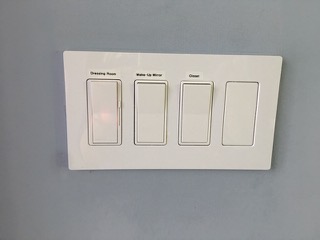
Now, if you know the story of the cobbler whose kids went barefoot, you will understand that just because I see “problem areas” in other people’s homes all day, this does not guarantee that I am a ruthless problem-solver in my own home.
Spoiler alert: not every shelf, bin or basket in my home is labeled!
Truth is, not every shelf, basket or bin NEEDS to be labeled. If it is obvious what it is and if no one is having an issue finding what they need, then there is no problem. But confusion breeds stress.
That same day, I went home and noticed myself doing the same thing to two of our three kitchen switches. That’s when I decided to do for myself what I do for others! So I labeled our switchplate. It’s been a game changer. The only thing I had to tweak was what I called them; my daughter did not think “door” made sense so we revised the label and now everyone is happy.
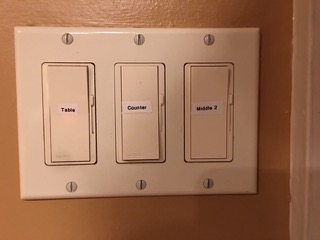
Our kitchen is the hub of our home, but now that the weather is warmer, we are spending a lot more time on our front porch.
Fast forward to the other day, when my husband texted me to make sure I turned off the front pathway lights. Our guests had stayed late the night before, and he didn’t want to waste electricity. In the daylight, I could not see if the lights were on or off… Couple that confusion with another multi-switch panel, and my stress level was rising. Without a partner to check the outdoor fixture’s bulb, it was more exercise than I expected so early in the morning. I figured it out on my own, turned the pathway lights off and did what any organized person would do: I labeled each switch.
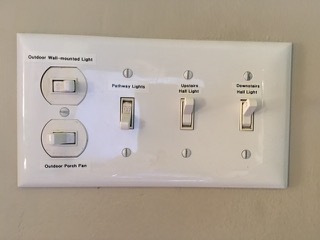
This time, my family approved of every label AND my daughter commented the next morning how helpful it was to know which switch controlled which hallway light. She had stayed up later than all — not unusual for teenagers — and knowing that we sleep with our door open at night to give our dog freedom, she didn’t want to wake us with a bright light at the top of the stairs.
My labels helped protect my investment of time, saved our daughter from waking us, and granted me an uninterrupted night’s sleep!
Think of where a label or two could help your household function a little better or brighter, or maybe even ensure a better night’s sleep for you.
Banish household confusion with a label or two; it’s illuminating!